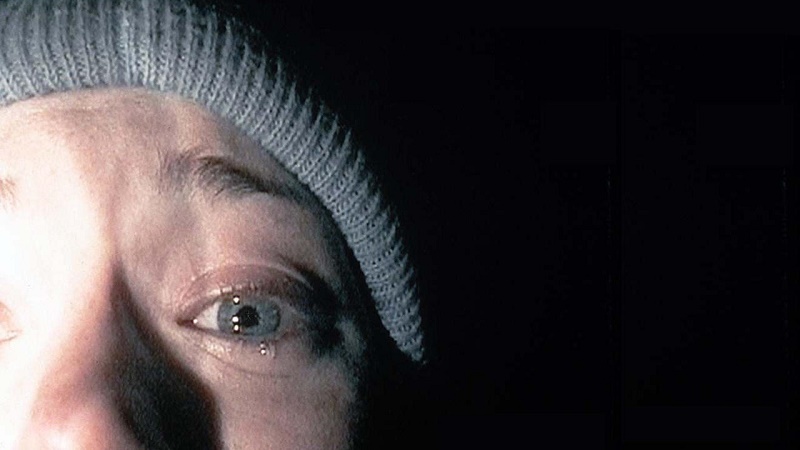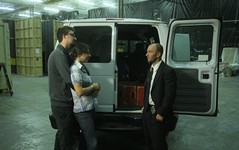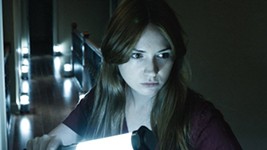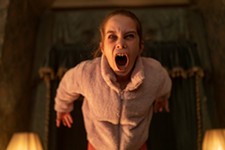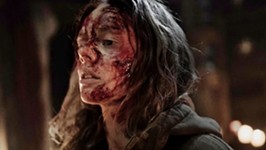Summoning the Blair Witch
Into the woods with Simon Barrett and Adam Wingard
By Richard Whittaker, 11:30AM, Fri. Sep. 16, 2016
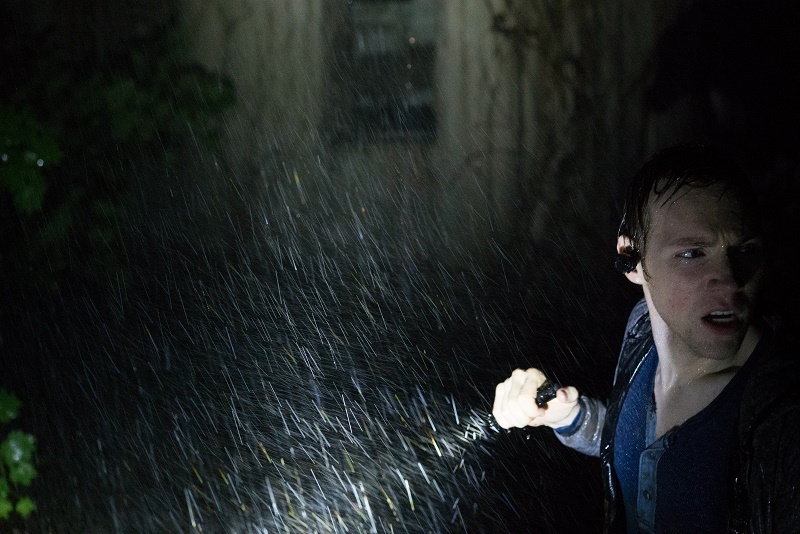
Love it or hate it, The Blair Witch Project birthed a genre, and any sequel will raise a firestorm. Simon Barrett, writer of the new installment, simply titled Blair Witch, is used to controversy. He said, "Every few years, one of our films comes out and everyone gets mildly angry, and then we go back to work."
Bypassing the events of 2000's Book of Shadows: Blair Witch 2, this latest episode goes back into the woods around Burkittsville following James (James Allen McCune), the brother of lost witch hunter Heather. Obsessed with the idea that she may still be alive, he drags three friends (Callie Hernandez, Corbin Reed, and Brandon Scott) and two Blair Witch obsessives (Wes Robinson and Valorie Curry) into the Maryland forests, in search of his sister and the myth that swallowed her.
Blair Witch is Barrett's fourth collaboration with director Adam Wingard (after A Horrible Way to Die, You're Next, The Guest, and their found-footage anthology VHS franchise). Wingard called the 1999 classic "the all-original found footage film, and the one that really kicked off. When you go back and watch it, you realize they got it right the first time. There's still not been a horror found-footage movie that had more of a commitment to realism." That's why he didn't simply try to imitate what had been done before. If he had taken the same spartan, lo-fi approach, he said, "everybody would be bored, because they've seen that version of it. We wanted to take that Blair Witch Project world, and that rich mythology, and essentially turn it into this roller-coaster ride. Just throw you out there and give you this very heightened Blair Witch experience."
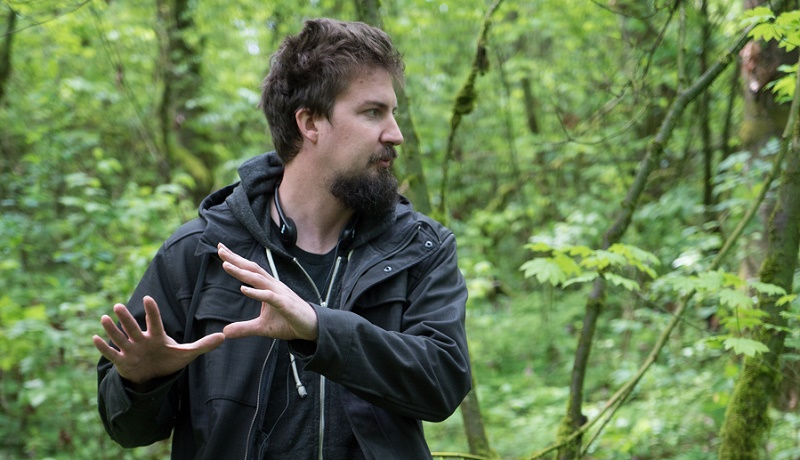
Austin Chronicle: Where did the idea come from to be either brave enough or insane enough to make a film where people will be mad at you because they hate the original, or mad at you because they love it?
Adam Wingard: To me, because there was that huge detour with Book of Shadows, the pressure was less that and more, "let's get this back on track."
It felt like it had run its course, weirdly. I was able to reflect on how I felt about the original film, and the subsequent sequel, as a fan. I remember what I wanted a Blair Witch 2 to be when it first came out, and honestly, as soon as the prospect came up that we could make a direct sequel to The Blair Witch Project, it was a no-brainer, because I know exactly how I would approach this, and the reason I know it's the correct way is because it's coming from the 16-year-old version of myself. Which is always a good sign of purity in terms of your intention.
Simon Barrett: There's something about being able to genuinely approach making a film as a fan. And, to clarify, it's not like we're smart enough or business savvy enough to say, "Hey, let's make a Blair Witch movie, let's see who has the rights." Because we're not. It was Lionsgate who was releasing You're Next, and they had this top-secret meeting, and we were the first filmmakers they talked to, and the last, obviously.
AC: Blair Witch is a milestone film for pioneering a genre. People always call Cannibal Holocaust the original found-footage movie, but I disagree, because of its framing mechanism, and the film-within-a-film approach.
AW: I disagree with that too, because it's not a full-on found footage. Any other film that would do that, you wouldn't call found footage now. The same with The Last Broadcast. I think that's a full-on found-footage movie until the end, and then it pulls itself out of it. So for me, if you're going to do a strict found-footage movie, you have to play by those found-footage rules for the entire film, or it doesn't really count.
SB: The French film Man Bites Dog, that's maybe the closest, but again that's a documentary crew making a documentary, and again nobody says how the footage was discovered. Whereas The Blair Witch Project does that. We could debate this all day, and maybe go back to David Holzman's Diary.
AC: So why have people spent so long trying to emulate what the original one did, and now you have to – not emulate, but build upon?
SB: On one hand, you have a great opportunity, because after the first Blair Witch, nobody can make a found-footage horror movie in the woods – which is a wonderful thing to do, because there's an innately horrifying, primal feeling about being alone and scared and lost with only a flashlight. But you can't do that, because you're just ripping off The Blair Witch Project, which is the most seminal found-footage horror of all time. We didn't have to worry about that, because we were making a sequel.
But it really was about using modern camera technology, and everything we had learned on the first VHS, to try to do something really different, and make the modern equivalent of what that first film did. By approaching it as fans, it was a little intimidating doing it, but it felt like our hearts were in the right place.
AC: How much did the VHS series help?
AW: It was a massive prep for us. Between the first two VHS films, not only the segments that we made and produced ourselves, but just having worked with every other filmmaker on it, you saw every other version of having an excuse for a found-footage plot to exist. Through that, we saw the different ways you could edit together a found-footage movie, the different ways you could pull them off, what's too sloppy, what's not sloppy enough. So it was very informative in that sense.
Although, weirdly enough, even through the course of having that experience, making this film felt like making the first found footage for us in a lot of ways.
SB: From our two years making the first two VHS, and working with (series creator) Brad Mishka and (producer) Roxanne Benjamin, I wouldn't say we had a master's degree, maybe a bachelor's degree in found-footage filmmaking. We definitely had a weird, very specific expertise that we were like, "Well, we'll never use that again."
AW: It more informed where to start.
SB: We definitely knew what all the challenges were. We knew it wasn't going to be easy, and we knew all the specific ways it wasn't going to be easy, and we could approach that even at a script level. I doubt it's a coincidence that Jason Constantine and Eda Kowan, our executives at Lionsgate who initially approached us with this, I don't think this was a coincidence that it was right after the premiere of VHS 2, where of course we worked with [Blair Witch co-director] Eduardo Sanchez and [producer] Gregg Hale. I think they saw that movie and went, "You know what? These guys are trying to make found-footage jump scares, maybe they'd have the right creative approach to this."
Blair Witch is in theatres now. For review and screening times, visit our Film Listings.
A note to readers: Bold and uncensored, The Austin Chronicle has been Austin’s independent news source for over 40 years, expressing the community’s political and environmental concerns and supporting its active cultural scene. Now more than ever, we need your support to continue supplying Austin with independent, free press. If real news is important to you, please consider making a donation of $5, $10 or whatever you can afford, to help keep our journalism on stands.
Richard Whittaker, May 27, 2014
Richard Whittaker, Feb. 5, 2014
Richard Whittaker, April 20, 2024
Richard Whittaker, March 11, 2024
May 16, 2025
May 16, 2025
Adam Wingard, Simon Barrett, Blair Witch, The Blair Witch Project





